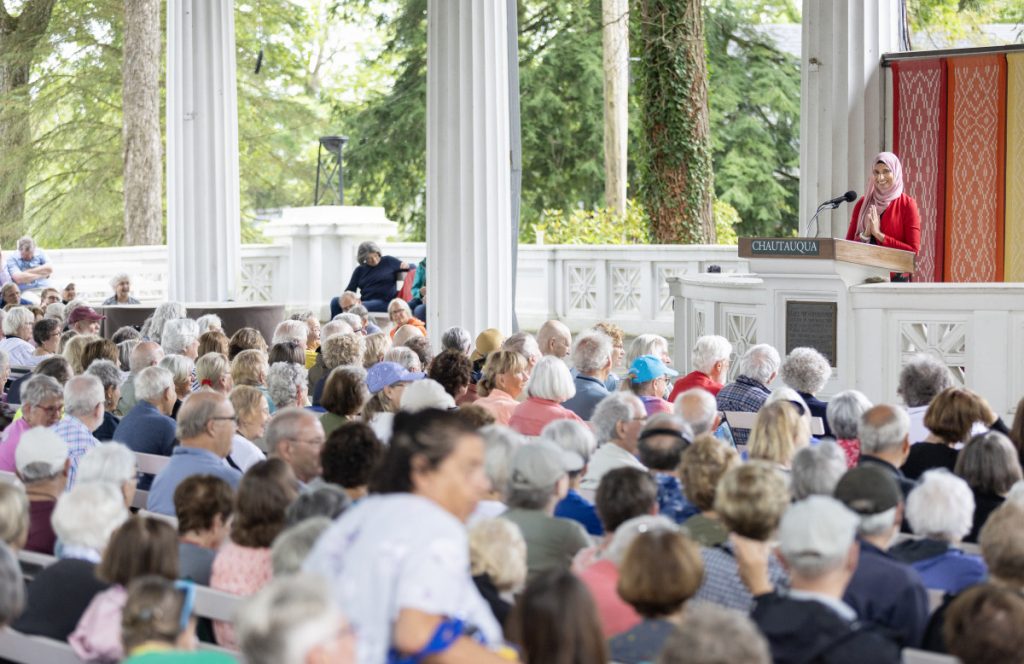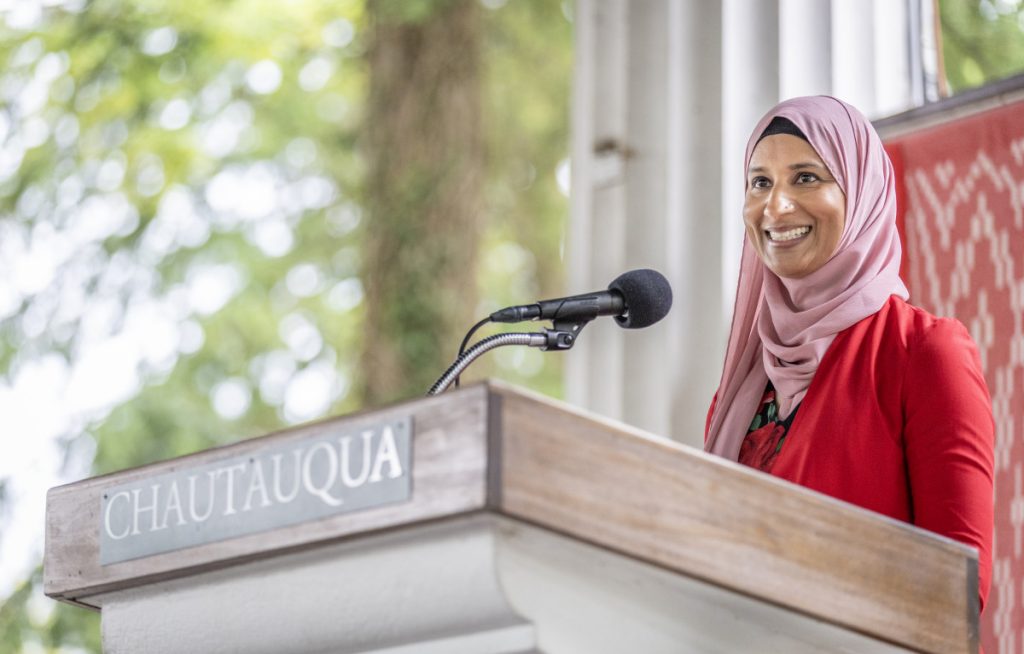
Sophia Neilsen
copy editor
Nausheena Hussain uses her stories to encourage everyone to create a society that values diversity and unification.
Hussain delivered her lecture at 2 p.m. Tuesday in the Hall of Philosophy, part of the Week Eight Interfaith Lecture Series theme, “Freedom of Religious Expression.” The lecture began with reflections on family, upbringing and cultural heritage, capturing the essence of adapting in a new country. Her story, she said, would lead to a touching poem that she wrote.
Hussain focused on her own lived experiences as a Muslim-American citizen of the United States, and with Muslim women facing the brunt of Islamophobia. She delved into the concept of freedom of expression within religious contexts, emphasizing the right to openly share one’s faith and beliefs without fear of persecution.
“The aftermath of 9/11 attacks, coupled with the ensuing conflicts of Afghanistan and Iraq, cultivated an atmosphere of … antagonism towards Muslim Americans,” Hussain said.
Her journey led her to work for the Islamic Resource Group, a nonprofit committed to fostering understanding between Muslim Americans and the broader community.
Hussain’s dedication to cultural heritage and togetherness emerged as she sacrificed her six-figure salary for a $12 per-hour wage. One evening, Hussain looked through her emails; she saw that the Council on American Islamic Relations was hiring. She submitted her application and, soon after, secured a position in the nonprofit organization.
“I was subscribed to the weekly emails from (CAIR). … I stood as a supporter of their cause, aligned with their mission to safeguard the civil liberties of Muslims against pervasive violations they faced in workplaces, schools, media, and the public,” she said.
“I applied my skills to protect not just civil liberties, but in particular the freedom of expression in relation to civil rights public policy,” she said.
Now, Hussain is principal of Nissa Consulting, providing services to Muslim-led nonprofits, and the co-founder and executive director emerita of Reviving the Islamic Sisterhood for Empowerment.
Freedom of expression in the context of religion, she said, refers to the right of individuals to express their religious beliefs or opinions, either privately or publicly, without fear of persecution or retaliation. The right is protected in international human rights laws, including the Universal Declaration of Human Rights and the International Covenant on Civil and Political Rights.

The right to exercise one’s faith is likewise protected by the right to free speech. This includes the freedom from restriction or retaliation to practice one’s religion openly and freely. However, she said, Muslims’ rights were routinely infringed in the workplace, in schools, and society.
“Muslims were not allowed to take breaks during their fast in the month of Ramadan; Muslim women were being fired for not abiding by a dress code,” she said. “Muslim kids were being bullied at public schools and were not being accommodated for taking the holiday off.”
In addition to the discrimination that Muslim people face individually, there is also a collective oppression, as faith leaders trying to establish mosques were accused of harboring terrorist cells. Hussain said if her first amendment right was in jeopardy, so was everyone else’s.
“Individuals in the United States have the right to express their religious beliefs or opinions freely without fear of government censorship or punishment,” she said. “This includes the right to express dissenting or critical views about your religion, or to question the beliefs or practices of a particular religion or religious institution.”
She said it’s important to note that freedom of expression may be subject to certain limitations, such as restrictions on hate speech or incitement to violence.
“If you can’t say something nice, don’t say nothing at all — which in today’s digital age seems to be forgotten,” Hussain said.
One nonprofit organization making a difference, she said, is Mary’s Pence. Through sponsoring community initiatives and encouraging collaboration to effect social change, Mary’s Pence supports women across America.
“Mary’s Pence seeks to be a space of belonging and purpose where community comes together to work for social justice,” she said.
The organization provides the initial funds for social justice groups, focused on women’s issues, to gather and connect.
Muslim women, she said, needed to amplify their voices and their presence within the political and non-political processes.
“When we weren’t at the table where decisions were being made about us, without us, our voices are silenced,” Hussain said. “Our opinions are ignored, and our communities marginalized.”
She shared a story about her dad’s friend who was held at gunpoint and shot while his convenience store was getting robbed. He later died.
“It devastated his family, and it was a very sad moment in our own lives,” Hussain said. “I didn’t realize until that moment gun violence had touched my life, also.”
A union of Muslim and Jewish women organized to go to the Minnesota state capitol and use their voices in support of gun control. From that grief and advocacy, a new collaboration emerged.
“(We advocated for) the implementation of universal background checks, the cessation of permitless carry policies and the prevention of Stand Your Ground bills that pose threats to the safety of our marginalized faith communities,” she said.
Hussain and her colleagues’ work against gun violence continued, with Christian, Muslim and Jewish neighbors uniting together to prevent gun violence through engagement, advocacy and community-led solutions.
“We advocated for sensible gun legislation to ensure that all gun owners in Minnesota practice safe storage to ensure the safety of all and provide resources to prevent suicides by guns,” she said.
The crowd in the Hall of Philosophy cheered.
“Our vision encompasses a future in which Muslim and Jewish women stand secure, possessing a profound sense of belonging within a closely bonded affinity group,” she said.
Reviving Sisterhood’s agenda encompasses a variety of public policy issues, such as reducing hate crimes and ending violence against women.
“We advocate for more stringent penalties for hate crimes involving the desecration of our mosques or synagogues or cemeteries and similar sacred spaces,” she said.
Both Muslim and Jewish women find themselves at the forefront of combating the intersection of religious prejudice and gender injustice: “According to the FBI, 18% of (hate crimes) were driven by religious animosity, and among these, anti-Jewish hate crimes saw a staggering 51% increase with a total of 683 reported cases,” she said. “While anti-Islamic or anti-Muslim hate crimes experienced a decline in 2022, they still remain significantly above historical averages.”
She said that while there may be fewer crimes overall, the intensity of those crimes has increased, as evidenced by the rise in murder and mass shootings – Muslim and Jewish women are disproportionately targeted by the violence.
“Beyond the acts of violence perpetuated against us, Muslims and Jews have embarked on a journey of interfaith collaboration to counteract a problematic narrative that seeks to pit our communities against each other,” she said
Everyone deserves protection from hate, Hussain said, irrespective of their race, their color, their religion, their gender, their sexual orientation, their gender identity, their gender, expression, age, national origin, immigration status, ethnicity or disability.
Religious expression adds to this diversity, allowing individuals of various beliefs to contribute to the public discourse and enrich the cultural fabric, she said. Ultimately, she encourages people to work toward a society that honors timeless wisdom and diversity. She ended the lecture with the aforementioned poem she wrote of the positive change within society and her Muslim community:
“She has ruby red lips, glittering gold, sparkling eyeshadow and flawless skin. A plum-purple, golden embroidered gown. Flowing gracefully with her every movement. A half dozen white roses clutched in her hand. Her name rings out, followed by an eruption of cheers and chants. Crossing the makeshift threshold of a royal court. She boldly walks across the fieldhouse, head raised high, making history with every step – she is crowned the homecoming queen. A diamond jewel tiara is placed ever so delicately, on top of her golden-colored hijab.”




